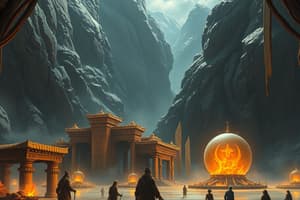Podcast
Questions and Answers
What is the primary focus of Marxism in understanding history?
What is the primary focus of Marxism in understanding history?
- Religious influences on historical events
- The impact of technology on societies
- The role of cultural achievements
- Class struggle and economic factors (correct)
Which period is characterized by feudalism and the rise of kingdoms in Europe?
Which period is characterized by feudalism and the rise of kingdoms in Europe?
- Classical Antiquity
- Early Modern Period
- Medieval Period (correct)
- Ancient History
Who is often referred to as the 'Father of History'?
Who is often referred to as the 'Father of History'?
- Herodotus (correct)
- Thucydides
- Leopold von Ranke
- Edward Gibbon
What defines the Early Modern Period in history?
What defines the Early Modern Period in history?
Which concept refers to the study of how history is written and interpreted over time?
Which concept refers to the study of how history is written and interpreted over time?
What is a primary source in historical study?
What is a primary source in historical study?
During which historical period did the Industrial Revolution occur?
During which historical period did the Industrial Revolution occur?
Which school of thought emphasizes long-term social history over political events?
Which school of thought emphasizes long-term social history over political events?
Flashcards are hidden until you start studying
Study Notes
Overview of History
- Definition: The study of past events, particularly in human affairs.
- Purpose: Understanding the development of societies, cultures, and civilizations over time.
Key Periods in History
-
Prehistoric Period
- Time before written records.
- Divided into Stone Age, Bronze Age, Iron Age.
-
Ancient History (c. 3000 BC to 500 AD)
- Rise of early civilizations (e.g., Mesopotamia, Egypt, Indus Valley, China).
- Importance of writing systems, trade, and governance.
-
Classical Antiquity (c. 500 BC to 500 AD)
- Flourishing of empires (e.g., Greece, Rome).
- Development of philosophy, mathematics, and arts.
-
Medieval Period (c. 500 AD to 1500 AD)
- Feudalism and the rise of kingdoms in Europe.
- The spread of Islam and the Byzantine Empire's influence.
-
Early Modern Period (c. 1500 AD to 1800 AD)
- Renaissance and Reformation; renewal of art and science.
- Age of Exploration leading to the colonization.
-
Modern History (c. 1800 AD to present)
- Industrial Revolution; significant technological advancements.
- World Wars and the development of contemporary geopolitical structures.
Key Concepts
-
Historical Sources:
- Primary Sources: Original documents (letters, diaries, artifacts).
- Secondary Sources: Analyses and interpretations of primary sources.
-
Historiography: Study of how history is written and interpreted over time.
-
Causation in History: Understanding cause-and-effect relationships in historical events (e.g., social, economic, political factors).
Major Theories
- Marxism: Focuses on class struggle and economic factors as driving historical changes.
- Postmodernism: Questions objective history and emphasizes multiple perspectives.
- Annales School: Emphasizes the study of long-term social history over political events.
Notable Historians
- Herodotus: Often called the "Father of History"; emphasized storytelling.
- Thucydides: Focused on political realism and empirical evidence.
- Leopold von Ranke: Advocated for a scientific approach to history based on primary sources.
Importance of Studying History
- Understanding societal change and continuity.
- Learning from past mistakes and successes.
- Cultivating critical thinking and analytical skills.
Definition of History
- History is the study of past events, specifically focusing on human affairs.
- Its purpose is to understand the development of societies, cultures, and civilizations across time.
Key Periods in History
- Prehistoric Period:
- This period began before written records were available.
- It's divided into the Stone Age, Bronze Age, and Iron Age.
- Ancient History:
- Between 3000 BC and 500 AD.
- Marked by the emergence of early civilizations (Mesopotamia, Egypt, Indus Valley, China).
- Development of writing systems, trade, and governance were crucial.
- Classical Antiquity:
- From 500 BC to 500 AD.
- Characterized by the flourishing of empires like Greece and Rome.
- This period saw significant advances in philosophy, mathematics, and the arts.
- Medieval Period:
- Spanning 500 AD to 1500 AD.
- Feudalism and the rise of kingdoms were prominent in Europe.
- The spread of Islam and the influence of the Byzantine Empire were also significant.
- Early Modern Period:
- From 1500 to 1800 AD.
- Marked by the Renaissance and Reformation, which revived art and science.
- The Age of Exploration and subsequent colonization were defining events.
- Modern History:
- Beginning in 1800 AD and continuing to the present.
- The Industrial Revolution brought significant technological advancements.
- This period also encompasses World Wars and the formation of present-day geopolitical structures.
Key Concepts in History
- Historical Sources:
- Primary Sources: Original documents like letters, diaries, or artifacts.
- Secondary Sources: Analyses, interpretations, or discussions of primary sources.
- Historiography: The study of how history is written and interpreted across different periods.
- Causation in History: Analyzing cause-and-effect relationships in historical events, including social, economic, and political factors.
Major Theories in History
- Marxism: Emphasizes class struggle and economic factors as the primary drivers of historical change.
- Postmodernism: Questions the idea of objective history, emphasizing the importance of multiple perspectives.
- Annales School: Focuses on long-term social history, rather than just political events.
Notable Historians
- Herodotus: Often referred to as the "Father of History," he highlighted storytelling in his work.
- Thucydides: Emphasized political realism and the use of empirical evidence.
- Leopold von Ranke: Advocated for a scientific approach to history based on primary sources.
Importance of Studying History
- Understanding the changes and continuities within societies.
- Learning from past mistakes and successes.
- Developing critical thinking and analytical skills.
Studying That Suits You
Use AI to generate personalized quizzes and flashcards to suit your learning preferences.



